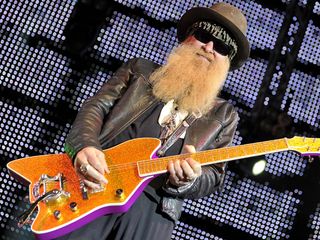
Billy Gibbons's 10 favourite blues albums of all time
"Ever since I was a little kid and first heard Jimmy Reed's Honey, Don't Let Me Go, the blues has been in my blood," says Billy Gibbons, ZZ Top's master of Lone Star-sized, down-and-dirty guitar licks. "The blues is a mighty long road. Or it could be a river, one that twists and turns and flows into a sea of limitless musical potential. The blues is life itself.
"Picking my favorite blues songs is a rather daunting challenge. I could go on for days, and we'd be listening to 78 rpm recordings that were made in the 1920s on discs of shellac. But the key word here is 'albums,' so that narrows the field. It brings us to the late 1940s when Columbia introduced a new format that was played at 33 1/3 rpms.
“Interestingly enough, some of the first blues albums or LPs were really collections or compilations of an artist’s singles. The record companies could take both A and B sides, put five or six of them together and call it an album. Oftentimes, an artist didn’t even know this was being done till after the fact.
Whether the styles originated from Chicago, the Mississippi Delta, Texas, or Great Britain - Billy Gibbons has absorbed them all, and each has played an important role in forming what has become his own recognizable sound. “I've definitely been an avid student of the genre my whole life," he says. "So in naming what I consider to be my favorite blues albums of all time, I pinpointed the artist first, and truthfully, I’d be happy to listen to just about anything they recorded. But then I took out the microscope and said, ‘All right, let’s find the key album.' I think we’ve got some good ones here.”
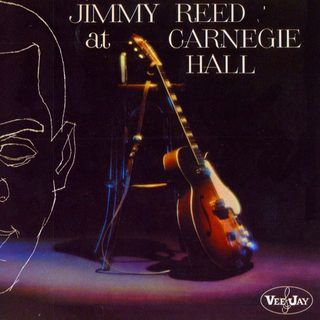
Jimmy Reed - Jimmy Reed At Carnegie Hall (1961)
“A rather lofty title, but it’s totally misleading because it wasn’t recorded at Carnegie Hall at all. It was a kind of attempt to suggest a concert at that venue. I guess the label wanted people to think, Wow, he played at Carnegie Hall. He must be important!
“Which, of course, he was. From the singles he did, like Ain’t That Lovin’ You Baby to Baby, Where You Going? to albums like I’m Jimmy Reed, the man was a treasure.
“This was a two-disc set, and that in itself was a novelty. I got it when I was around 10 or 11. I don’t think I ever saw a record that had two discs in it before. Such a cool album.
“Musically, somebody might listen to this and go, ‘Oh, that’s just three-chord stuff.’ But the complexity that takes place between the exchange of [co-guitarist] Eddie Taylor and Jimmy Reed is fascinating. A Mississippi mystery. Even though they’re playing two entirely different figures, it all meshes in a way that makes it impossible to figure out who’s playing what. I think this record influenced many, many guitarists. Check it out, it’s a party!”
Listen: Jimmy Reed At Carnegie Hall - Bright Lights, Big City (1961)
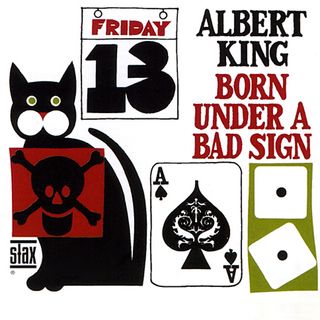
Albert King - Born Under A Bad Sign (1967)
“One of the greatest players to ever pick up the guitar. Oddly enough, he started out as a drummer. Figure that one out. Not only that, but he was left-handed and a lot of the time he played right-handed models flipped upside-down.
“Albert had been releasing singles for quite a while, since the mid-‘50s, but he’s probably best known for the phenomenal recordings he did for Stax in the ‘60s. This was his second album for Stax, and even though it’s comprised of singles, it works as a whole album.
“And dig the backing band - Booker T And The MGs. You can’t ask for much more. Again, I call this album part of the ‘Mississippi mystery.’ How did Albert King get that sound? I don’t know. But it’s all right here. Songs like Born Under A Bad Sign, Crosscut Saw, The Hunter…man, they’re just the coolest. Guitar players who want to study a one-of-a-kind tone and hear a man who really knew how to bend a note can’t go wrong with Albert King.”
Listen: Albert King - Born Under A Bad Sign (1967)
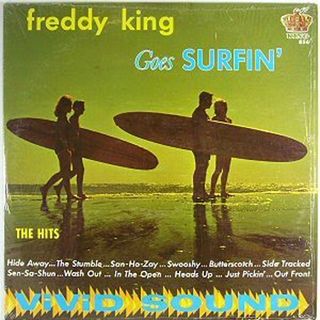
Freddy King - Freddy King Goes Surfing (1963)
“What a crazy title! It’s not a surf album at all, of course. I think it’s basically a reissue of his previous album [Let’s Hide Away And Dance Away With Freddy King], which featured his big hit Hide Away.
“I guess they stuck the surf picture and title on the record to capitalize on The Beach Boys and the whole West Coast craze that was going on at the time – which Freddy King had nothing to do with.
“Although Freddy later became known for being a fine vocalist, he was one of the best blues guitarists ever, and this album really shows what a creative and aggressive guitar player he was. Between the lead lines are little rhythm lines, and they’re all played by Freddy! He could fill in the blanks all by himself. Freddy found all the right notes – nothing was superfluous. When we tour, I make sure to have this on the iPod, so we get to treat the audience and the crew to Freddy King before we come on.”
Listen: Freddy King - Hide Away (1963)
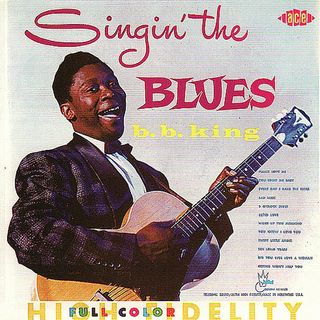
BB King - Singin' The Blues (1956)
“I was very fortunate. My dad was a musician, he would take me around to recording studios in Houston. I got to hear some really rippin’ stuff at a very young age. There were all of these rambunctious country artists and guys playing this hod-rod hillbilly music. It blew my mind, as you can imagine. Well, one day we to went ACA Studios, and I got to see BB King play. I must’ve been about seven years old. What a trip!
“Needless to say, he made a big impression, and later on, I got ahold of this record, which has always been one of my favorites. Something about it just resonates. The lead lines that BB plays are chilling. Although it’s called ‘Singin’ The Blues,’ on this album I think the guitar really comes to the fore as a strident solo instrument.
“It’s often been said that Billy could do more with one note than most guitarists can do with 100, and I think it might have started right here. He had developed his technique so fully - it was so unique and elegant – that he was able to play these ‘blue’ notes on songs that even had almost cha-cha beats. This is a record I never have to rediscover because it never went away.”
Listen: BB King - Sweet Little Angel, Ten Long Years, Did You Ever Love A Woman (1956)
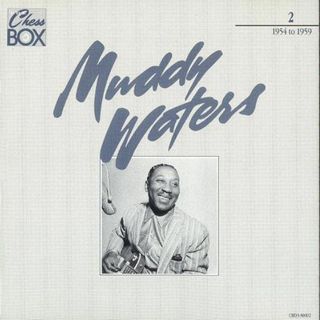
Muddy Waters - The Chess Box (1989)
“This goes up to the Chicago stuff. When all the Mississippi guys made it up to Chicagoland, the Chess Brothers started picking them up and made it possible for them to record some stunning material.
“There’s so much good stuff here that I don’t even know where to begin. Louisiana Blues, Rollin’ And Tumblin’, Long Distance Call, I Can’t Be Satisfied – all of these recordings were turning points in that, once electricity entered the picture, bands with three and four people in them could do battle with Duke Ellington and Count Basie and 10-piece horn sections.
“Muddy Waters had a very distinctive guitar tone. When he played a Gibson Les Paul goldtop, you could really identify the sound, and you knew who it was. Compared to BB or Freddy or Albert, his playing might not have been so fanciful, but his licks were stinging and ferocious. And he laid down a lot of Delta-based slide guitar, too. Just because he was in Chicago, he didn’t leave his humble beginnings behind.”
Listen: Muddy Waters - Louisiana Blues (1950)
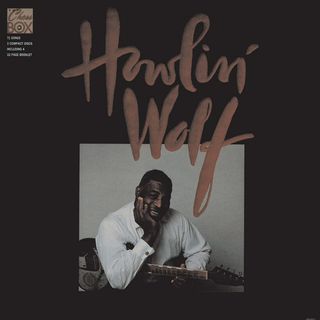
Howlin' Wolf - The Chess Box (1991)
“Not so much for the guitar work, but what’s represented on this collection is a real tight, small band. Wolf’s nickname was appropriate because he actually sounded like a wild animal when he sang. What an outrageous, maniacal voice! He could’ve been a star of those old Wolfman movies and they wouldn’t have needed any special effects.
“He played great harmonica, and he could certainly get with it on the guitar. He had a mystique that came through on record. He could be overwhelming and scary. Not many artists can do that. So I’d call him one of the true originals of the blues. I love this collection. Just to have one big box set that encompasses something like ten different recordings, that’s pretty special."
Listen: Howlin' Wolf - Spoonful (1960)
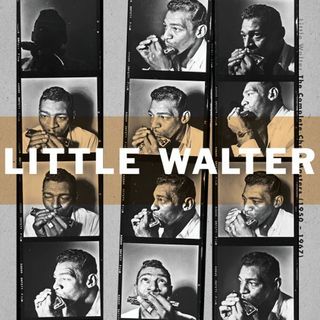
Little Walter - The Complete Chess Masters (2009)
“Little Walter was a cool character. He had attitude, skill…the whole act, he had it down. He could play guitar, but he was a master of the harmonica. Basically, he wanted to be the stand-in for a four or five-piece horn section. People weren’t used to seeing a guy cup a microphone around a harmonica, crank it up and just blast off on these wild solos. He was practically his own band – he was certainly loud enough.
“As well as his skills on the harp, Little Walter became a fine singer. In fact, he used to be in Muddy Waters' band until he struck out to find success on his own. And he got it, too: His first big hit was a song called Juke, and it’s pretty incredible.
“You listen to eight or 10 Little Walter songs and you’ll probably have to scrape yourself off the floor or the ceiling, depending on which way the music sent you. This big ol’ box set, I can’t imagine what it would do to people hearing Little Walter for the first time. You might need some intermissions between discs just to get your senses back in working order.”
Listen: Little Walter - Juke (1952)
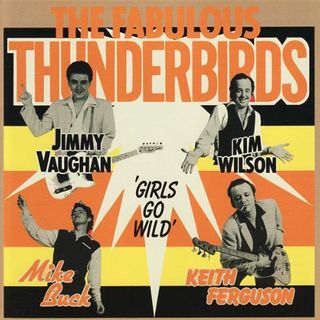
The Fabulous Thunderbirds - Girls Go Wild (1979)
“One of my all-time favorite bands. What I admire about them so much is that they ‘learned to unlearn.’ Jimmie Vaughan had perfected techniques on the guitar to the point where he could keep up with the best of them, as had the rest of the lineup. They recognized the idiom of the blues as an art form long before people talked about it in such a way.
“Everybody in the band had done their homework and figured out that this wasn’t some simplistic, sports bar music; this was serious business. But they dished it out in a way that was both fierce and casual. I think this is one of the finest interpretations of the blues that has ever found its way to the marketplace. Not a bad moment anywhere. It’s a beauty.”
Listen: The Fabulous Thunderbirds - Rock With Me (1979)
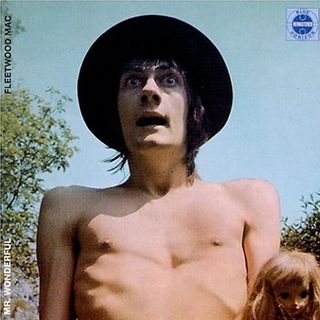
Fleetwood Mac - Mr Wonderful (1968)
“It’s interesting to me that at a time when so many American bands and acts were getting into the pop thing, across the pond you had all of these great British musicians studying the blues. What Peter Green’s version of Fleetwood Mac did with the blues was not only authentic, it was positively enchanting.
“They figured out a way to have a good time, but they had their own unique sound and approach. In many ways, they cast a spell on you. They transported you to wherever they wanted to take you. That’s the mark of a great band, but as blues artists, that’s the mark of musicians who have really gotten inside each note.
“There have been a host of fabulous players who have called Fleetwood Mac their home, but this lineup is one to be reckoned with, and Mr Wonderful just might be their finest hour.”
Listen: Fleetwood Mac - Love That Burns (1968)
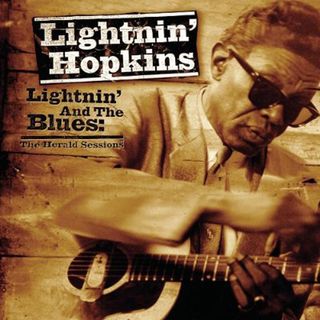
Lightnin' Hopkins - Lightnin' And The Blues (1954)
“He released records on numerous labels, but this album was on the Herald imprint, and it features a song called Moving Out Boogie that alone is worth the price of admission.
“He kind of talks his way through it – it’s not really singing in the traditional sense – but the guitar playing could wake the dead. What he does in two and a half minutes on the guitar is enough to make you want to throw your fuzz and wah-wah pedals as far away as you can. Just toss 'em over the fence!
“If you can play Moving Out Boogie with even a third of the spirit of Lightnin’ Hopkins, then you just might have a chance. It’s the way to move, man. He played it like he wanted to play it.
“Our fair bassist, Dusty Hill, worked with Lightnin’ Hopkins a bit, and one time he said, ‘You know, Lightnin’, you seem to play in odd time signatures. One verse will be eight bars, and the next will be 10 bars.’ And Lightnin’ just said, ‘It don’t matter. Lightnin’ changes when Lightnin’ wants to change.’”
Listen: Lightnin' Hopkins - Moving Out Boogie (1954)

Joe is a freelance journalist who has, over the past few decades, interviewed hundreds of guitarists for Guitar World, Guitar Player, MusicRadar and Classic Rock. He is also a former editor of Guitar World, contributing writer for Guitar Aficionado and VP of A&R for Island Records. He’s an enthusiastic guitarist, but he’s nowhere near the likes of the people he interviews. Surprisingly, his skills are more suited to the drums. If you need a drummer for your Beatles tribute band, look him up.

"There was water dripping onto the gear and we got interrupted by a cave diver": How Mandy, Indiana recorded their debut album in caves, crypts and shopping malls

"Despite recording some truly iconic albums that became a huge part of pop culture history, he always felt like one of us": Five seminal records Steve Albini worked on

"There was water dripping onto the gear and we got interrupted by a cave diver": How Mandy, Indiana recorded their debut album in caves, crypts and shopping malls

"Despite recording some truly iconic albums that became a huge part of pop culture history, he always felt like one of us": Five seminal records Steve Albini worked on
Most Popular







